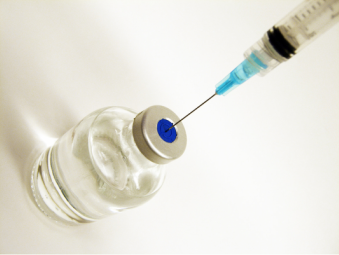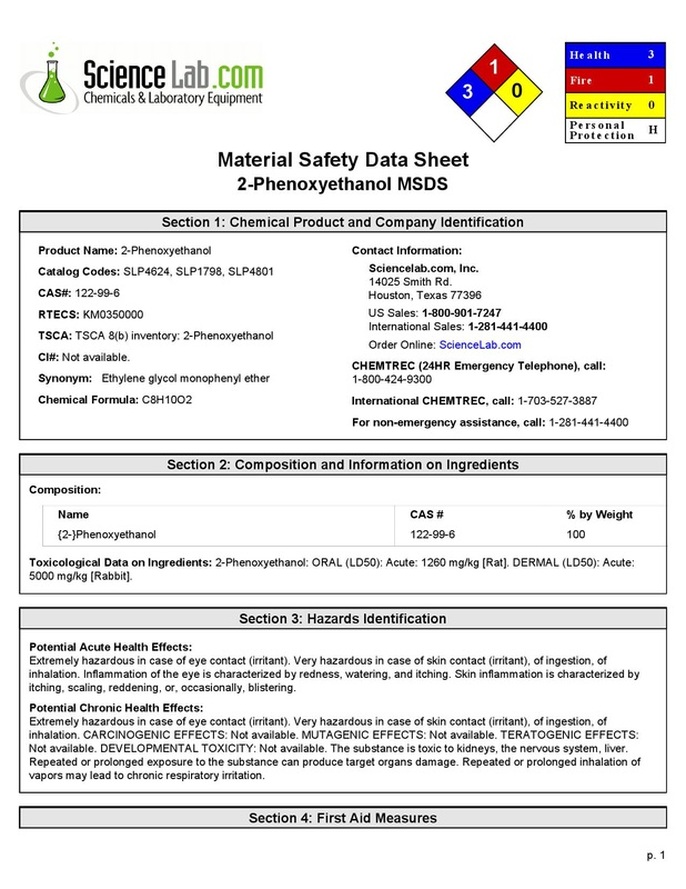European Journal of Dermatology. Vol. 13, Issue 1, January - February
2003:
10-5, Review articles
Summary: Allergic and pseudo-allergic reactions to vaccines frequently involve the skin, and can be generalized systemic symptoms (urticaria/angioedema, serum sickness, flares of eczema) or localized at the sites of vaccination (persistent nodules, abcesses, granulomas). Diagnosis of Arthus-type reactions is based on clinical history and specific IgM/IgG anti-toxoid determination. For other local reactions, diagnostic value of non-immediate responses in skin tests varies with clinical symptoms and substances involved. Immediate responses in skin tests and specific IgE determination have good diagnostic and/or predictive value in anaphylaxis and immediate/accelerated urticaria/angioedema to toxoid-, pneumococcus-, and egg- and gelatin-containing vaccines. Diagnosis of reactions to dextran in BCG is based on specific IgM/IgG determination. Most non-immediate generalized reactions result from non-specific inflammation, except for gelatin-containing vaccines, but the diagnostic value of immuno-allergological tests with the vaccines and gelatin are controversial. Withholding booster injections is advised if specific IgM/IgG levels are high. If the levels are low, sequential injections of vaccines containing a single vaccinating agent are usually tolerated. However, injections of the vaccine should be performed using a " desensitization " procedure in patients reporting anaphylaxis and immediate/accelerated urticaria/angioedema.
Author(s): Claude PONVERT, Pierre SCHEINMANN Keywords: Allergy to vaccines, dextran, gelatin, ovalbumin, pneumococcal vaccine, toxoids, skin tests, specific IgE, specific IgG.
© John Libbey Eurotext
2003:
10-5, Review articles
Summary: Allergic and pseudo-allergic reactions to vaccines frequently involve the skin, and can be generalized systemic symptoms (urticaria/angioedema, serum sickness, flares of eczema) or localized at the sites of vaccination (persistent nodules, abcesses, granulomas). Diagnosis of Arthus-type reactions is based on clinical history and specific IgM/IgG anti-toxoid determination. For other local reactions, diagnostic value of non-immediate responses in skin tests varies with clinical symptoms and substances involved. Immediate responses in skin tests and specific IgE determination have good diagnostic and/or predictive value in anaphylaxis and immediate/accelerated urticaria/angioedema to toxoid-, pneumococcus-, and egg- and gelatin-containing vaccines. Diagnosis of reactions to dextran in BCG is based on specific IgM/IgG determination. Most non-immediate generalized reactions result from non-specific inflammation, except for gelatin-containing vaccines, but the diagnostic value of immuno-allergological tests with the vaccines and gelatin are controversial. Withholding booster injections is advised if specific IgM/IgG levels are high. If the levels are low, sequential injections of vaccines containing a single vaccinating agent are usually tolerated. However, injections of the vaccine should be performed using a " desensitization " procedure in patients reporting anaphylaxis and immediate/accelerated urticaria/angioedema.
Author(s): Claude PONVERT, Pierre SCHEINMANN Keywords: Allergy to vaccines, dextran, gelatin, ovalbumin, pneumococcal vaccine, toxoids, skin tests, specific IgE, specific IgG.
© John Libbey Eurotext
* Propylene Glycol (PG)
Material Safety Data Sheets warn users to avoid skin contact with this substance, and protective clothing should be worn at all times. It is the cosmetic form of mineral oil found in automatic brake fluid, hydraulic fluid and industrial antifreeze, yet is also found in make-up, hair and skin care products, deodorants, and aftershave.
The related agent, Polyethylene Glycol (PEG) which is found mainly in skin cleansers is a caustic used in industry to dissolve grease. Both of these are strong skin irritants and can cause contact dermatitis, liver abnormalities and kidney damage.
"It is the most common moisture-carrying vehicle, other than water, in cosmetics. It has better permeation through the skin than glycerin and is less expensive; although it has been linked to more sensitivity reaction.
Industrial Use
1. Anti-Freeze
2. Paint
3. Floor Wax
Personal Care Products
1. Shampoos
2. Hair Conditioners
3. Hand and Body Lotions
4. Skin and Beauty Creams
5. Deodorants
Implicated in contact dermatitis, kidney damage and liver abnormalities; can inhibit cell growth in human tests and can damage membranes causing rashes, dry skin and surface damage. -From Material Safety Data Sheets (MSDS)
Propylene Glycol causes significant number of reactions and was a primary irritant to the skin in low levels of concentrations. -The American Academy of Dermatologists Inc, Jan 1991
May be harmful by inhalation, ingestion or skin absorption. May cause eye irritation. Exposure can cause gastro-intestinal disturbances, nausea, headache and vomiting, central nervous system depression.
-From Material Safety Data Sheets (MSDS)
http://news.bbc.co.uk/1/hi/scotland/2617997.stm
Whisky cure after anti-freeze error
A woman who drank anti-freeze was prescribed whisky as an antidote after her potentially life-threatening mistake. Glennis Middleton, from Forfar in Angus, was told that anti-freeze can cause kidney failure, blindness and even death. Doctors at Ninewells Hospital in Dundee told her that alcohol was the antidote and gave her a choice of gin, vodka or whisky.
She chose whisky - known as the "water of life" - and was given two cupfuls to drink immediately. Doctors stress that the correct dose has to be given and blood levels monitored thereafter. Mrs Middleton drank antifreeze left on a table by a relative who she was helping decorate her house.
She said she was "stunned" when doctors told her how serious it could be. "It's amazing the number of people who have spoken to me to say that they keep antifreeze in the back of the car - and that's people with toddlers. "There was a four to five hour waiting time at the accident and emergency department, but I got taken in after about 30 seconds.
"The doctors say about 100 millilitres of antifreeze is sufficient to kill you - I had between half a cupful and a cupful of the stuff. "I think it's all the more dangerous because it doesn't taste bad - I thought it was particularly strongly-flavoured water. It didn't taste bitter."
She added: "The medical staff at Ninewells were concerned about me because they previously had a patient who died 22 hours after taking it. "I was thinking that I was all right and that I had more important things to do but the doctor was saying to me 'you could die here, woman, you must stay'."
Asked if she had known alcohol was the antidote, Mrs Middleton replied: "I would not personally have assumed that, no, but that's the most effective thing against ethylene glycol, which effectively breaks down the kidneys and the liver. "It stops the kidneys and the liver from working and then you die."
Dr Shobhan Thakore, of Ninewells Hospital's A&E department, said: "Potentially, fairly small amounts (of antifreeze) can kill you. "When the body breaks them down it makes products which are toxic. "The potential is that it causes kidney failure and can cause seizures, and the methanol can cause blindness."
Material Safety Data Sheets warn users to avoid skin contact with this substance, and protective clothing should be worn at all times. It is the cosmetic form of mineral oil found in automatic brake fluid, hydraulic fluid and industrial antifreeze, yet is also found in make-up, hair and skin care products, deodorants, and aftershave.
The related agent, Polyethylene Glycol (PEG) which is found mainly in skin cleansers is a caustic used in industry to dissolve grease. Both of these are strong skin irritants and can cause contact dermatitis, liver abnormalities and kidney damage.
"It is the most common moisture-carrying vehicle, other than water, in cosmetics. It has better permeation through the skin than glycerin and is less expensive; although it has been linked to more sensitivity reaction.
Industrial Use
1. Anti-Freeze
2. Paint
3. Floor Wax
Personal Care Products
1. Shampoos
2. Hair Conditioners
3. Hand and Body Lotions
4. Skin and Beauty Creams
5. Deodorants
Implicated in contact dermatitis, kidney damage and liver abnormalities; can inhibit cell growth in human tests and can damage membranes causing rashes, dry skin and surface damage. -From Material Safety Data Sheets (MSDS)
Propylene Glycol causes significant number of reactions and was a primary irritant to the skin in low levels of concentrations. -The American Academy of Dermatologists Inc, Jan 1991
May be harmful by inhalation, ingestion or skin absorption. May cause eye irritation. Exposure can cause gastro-intestinal disturbances, nausea, headache and vomiting, central nervous system depression.
-From Material Safety Data Sheets (MSDS)
http://news.bbc.co.uk/1/hi/scotland/2617997.stm
Whisky cure after anti-freeze error
A woman who drank anti-freeze was prescribed whisky as an antidote after her potentially life-threatening mistake. Glennis Middleton, from Forfar in Angus, was told that anti-freeze can cause kidney failure, blindness and even death. Doctors at Ninewells Hospital in Dundee told her that alcohol was the antidote and gave her a choice of gin, vodka or whisky.
She chose whisky - known as the "water of life" - and was given two cupfuls to drink immediately. Doctors stress that the correct dose has to be given and blood levels monitored thereafter. Mrs Middleton drank antifreeze left on a table by a relative who she was helping decorate her house.
She said she was "stunned" when doctors told her how serious it could be. "It's amazing the number of people who have spoken to me to say that they keep antifreeze in the back of the car - and that's people with toddlers. "There was a four to five hour waiting time at the accident and emergency department, but I got taken in after about 30 seconds.
"The doctors say about 100 millilitres of antifreeze is sufficient to kill you - I had between half a cupful and a cupful of the stuff. "I think it's all the more dangerous because it doesn't taste bad - I thought it was particularly strongly-flavoured water. It didn't taste bitter."
She added: "The medical staff at Ninewells were concerned about me because they previously had a patient who died 22 hours after taking it. "I was thinking that I was all right and that I had more important things to do but the doctor was saying to me 'you could die here, woman, you must stay'."
Asked if she had known alcohol was the antidote, Mrs Middleton replied: "I would not personally have assumed that, no, but that's the most effective thing against ethylene glycol, which effectively breaks down the kidneys and the liver. "It stops the kidneys and the liver from working and then you die."
Dr Shobhan Thakore, of Ninewells Hospital's A&E department, said: "Potentially, fairly small amounts (of antifreeze) can kill you. "When the body breaks them down it makes products which are toxic. "The potential is that it causes kidney failure and can cause seizures, and the methanol can cause blindness."

